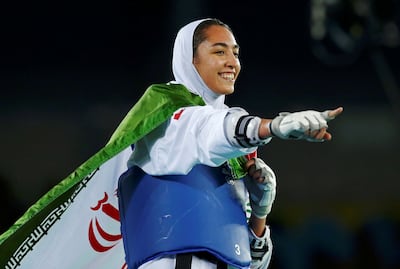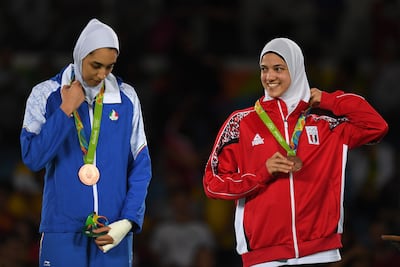Last Wednesday, an announcement made at a news conference in Sofia, Bulgaria’s capital, broke many hearts in Iran. With her characteristic sunny smile, the taekwondo athlete Kimia Alizadeh declared that she was joining the Bulgarian national team, hoping to compete under its flag at the Paris Olympics this summer.
Alizadeh was accompanied by the chairman of Bulgaria’s taekwondo federation who called her a “potential gold” and asked his government to work swiftly on the necessary paperwork. The deadline for submission to Olympics was April 15, he added.
The news was bittersweet for those of us who have followed the remarkable career of 25-year-old Alizadeh. She became a household name in Iran almost eight years ago, on August 19, 2016, when she won a bronze medal at the Rio de Janeiro Olympics in Brazil, at the age of 18.
Having defeated her Swedish rival in three rounds, just as she had previously defeated Croatian and Thai competitors, Alizadeh made history, becoming the first Iranian woman to win an Olympic medal. Sixty-eight years after Tehran first fielded athletes in the games, an Iranian woman had finally climbed the podium.

It was a shot in the arm for the advocates of women’s sports in Iran who had long had to overcome many obstacles, most importantly a long list of misogynist laws. The most contentious of these forces all women to cover their hair and full body except for the face and hands, up until the wrist, a restriction that could be especially limiting for athletes.
Another law mandates that women athletes, like all other women in Iran, can only leave the country with the permission of their husbands or other male guardians. Many Iranians bitterly remembered how in 2015, Niloofar Ardalan, captain of the national futsal team, had been barred from leaving the country by her husband (a well-known sports commentator with the state broadcaster) and was unable to compete in the Asian championship in Malaysia.
Alizadeh’s Rio victory was made more meaningful by the fact that Iran had sent one of its largest-ever women delegations to the Olympics with a total of nine female athletes (out of 63) in diverse fields such as archery, athletics, ping pong, shooting and rowing.
Alizadeh received immediate nationwide fame and official recognition by then-president Hassan Rouhani and other officials. Yet even the very image of her victory gave her audience a sense of the limitations she faced: her hair covered with a white scarf. Interestingly, she stood next to Egypt’s Hedaya Malak who, like her, won a bronze medal in the same category and wore an almost identical white scarf.

But there was a difference. Alizadeh had been forced by her government to don the hijab whereas Malak was doing so out of choice. Of the 37 women representing Egypt in Rio, some wore the hijab and some didn’t. The latter included Ebtissam Mohamed, a road and track cyclist who engaged in a sport that was banned in Iran for women, and Maha Amer and Maha Gouda who competed in professional swimming suits in diving, something that Iranian women could only dream of.
If the Egyptian delegation showed the diversity among Muslim athletes, the Iranian team was a depressing reminder of the obstacles its women faced. At the time, Iran was the only country in the world that enforced the hijab ban (the Taliban in Afghanistan has since joined the club).
It was thus not particularly surprising when, in January 2020, Alizadeh declared that she had left Iran for good. Having previously endorsed Mr Rouhani during his 2017 re-election campaign, Alizadeh had shown a political consciousness and a hope for her country’s progress.
But by 2020, following the brutal clampdown on the protest movements of 2017 and 2019, it had become clear that things were not getting any better and she preferred to continue her career elsewhere.
In a poignant Instagram post, she wrote: “I am not a maker of history or a flag-bearer for the Iranian caravan. I am but one of the millions of oppressed women in Iran. For years, they played me however they liked. They took me wherever they wanted. I wore whatever they asked me to. I repeated whatever they told me to. I won medals which they attributed to the forced hijab and their own management and foresight.”
She had simply had enough. Her defection came months after that of another Iranian athlete, the judoka Saeid Mollaei, who had also competed in Rio 2016 and won a gold medal at the 2018 World Judo Championships in Baku.

Mollaei defected when he was forced to lose the games just so that he wouldn’t have to face Israel and thus break the regime’s ban on competing with Israeli athletes. He has since competed under the Mongolia and Azerbaijan flags, including during the 2021 Olympics in Tokyo and the Grand Slam games in Tel Aviv the same year. His enduring friendship with a fellow Israeli judoka has been subject to a film, co-directed by Iranian and Israeli filmmakers, featuring at the Venice film festival last year.
Unable to sign up with a new team in time for the Tokyo Olympics, Alizadeh was sponsored by Germany and joined 28 other athletes from the likes of Syria, Congo and South Sudan by playing in the second-ever refugee team.
She was one of the few athletes in the team not from a war-torn country. It was a sad reminder that could also be observed in any visit to refugee camps of Greece or North Macedonia: even without a war Iran was, in effect, producing refugees on a grand scale.
Last week’s news means that Alizadeh has found a new home in Bulgaria.
Some media outlets in Iran are predictably attacking Alizadeh with slurs, claiming that playing for Bulgaria is a big demotion for her, despite the fact that with 230 Olympics medals in its history, the Eastern European country is a force to be reckoned with.
The Hamshahri newspaper, run by Tehran’s hardline-led municipality, mocked Alizadeh saying that she has finally found a home “after a few years of peddling around”, simultaneously insulting her and other displaced people.
For their part, Iranian feminists and advocates of women’s sports speak for many of their compatriots when they share their dual reactions: happy that Alizadeh will be able to continue her excellence on the tatami and sad that Iran has lost one more talent.
Speaking to media, Frankfurt-based scholar and activist Forough Kanani said she had cried when she heard of the news, calling it a “painful” sign of “Islamic Republic’s incompetence”. Oslo-based journalist Asieh Amini also called it a “loss for Iran” and lamented that “Iran was depriving itself from such talents”.
We can only dream of a day when talented Iranian women such as Alizadeh can once more find glories under the Iranian tricolour.


